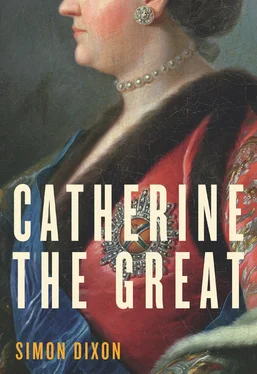Russia’s international position was still critical when Radishchev’s Journey from St Petersburg to Moscow appeared in May 1790. A book that criticised ‘the murder called war’ was bound to catch Catherine on the raw. ‘What do they want?’ she asked in a splenetic marginal comment. ‘To be left defenceless to fall captive to the Turks and Tatars, or to be conquered by the Swedes?’ A noble writer twenty years her junior, Radishchev had grown up as a page at the empress’s Court and had been one of the first Russian students selected to study at Leipzig at her government’s expense. 108Now he had betrayed her trust with a fictional travelogue in the mould of Sterne’s Sentimental Journey. His book launched a stinging attack on the evils of favouritism and a bitter critique of the inhumanity of slavery, derived from Radishchev’s reading of Raynal’s History of the Two Indies and now applied to Russian serfdom in particular. The empress was appalled. ‘The purpose of this book is clear on every page,’ she retorted in notes which subsequently provided the basis for the interrogation conducted by Sheshkovsky, the prosecutor who later investigated Novikov. ‘Its author, infected and full of the French madness, is trying in every possible way to break down respect for authority and for the authorities, to stir up in the people indignation against their superiors and against the government.’ If Radishchev’s views on serfdom made him a rebel worse than Pugachëv, then the chapter on corruption, levelled primarily at Potëmkin (identifiable by his craving for oysters), revealed the purpose of the whole book: ‘It is a safe bet that the author’s motive in writing it was this, that he does not have entrée to the palace . Maybe he had it once and lost it, but since he does not have it now but does have an evil and consequently ungrateful heart, he is struggling for it now with his pen.’ As Catherine sensed, the point of Radishchev’s book could be derived from the very direction of travel of his fictional narrator—towards the heart of old Muscovy and away from the false foreign values of her northern Residenzstadt . ‘Our babbler is timid. If he stood closer to the sovereign, he would pipe a different tune. We have seen a lot of such humbugs, especially among the schismatics.’ 109Although Catherine eventually commuted Radishchev’s death sentence to exile in Siberia, where his passage was smoothed by his embarrassed patron, Alexander Vorontsov, no one could miss the increasing signs of a significant change of heart on the empress’s part—a mounting hostility to the intellectual independence of the very writers whom she had done so much to encourage in the earlier part of her reign. Its twilight years would be recalled as a period of intellectual repression.
CHAPTER TWELVE
End of an Era
1790–1796
The Swedish menace evaporated as suddenly as it had appeared after a period of rising alarm in the spring of 1790. When a courier arrived at Tsarskoye Selo on 4 May to announce the capture of an enemy man-of-war off Reval, Catherine hastily announced thanksgiving prayers: she had scarcely slept in anticipation of an adverse result. 1When Admiral Chichagov nevertheless failed to block the Swedish fleet’s course toward the Russian capital, her nerves stretched tauter still. From dawn on 23 May, ‘a terrible cannonade’ echoed all day, rattling windows from St Petersburg to the summer residence. ‘Anxiety’ was Khrapovitsky’s laconic comment. 2While Catherine tried to ease the tension by boating on the lake, the implications for the conflict on the Danube were inescapable. ‘Everyone is sick of the war,’ Zavadovsky told Field Marshal Rumyantsev on 14 June. ‘Any peace would be desirable and useful in our state of complete exhaustion.’ 3Subsequent developments were even more disturbing. Although the Russian galley fleet under Prince Nassau Siegen captured seven Swedish ships of the line at Vyborg on 22 June, it proved to be a pyrrhic victory. Even as the empress was boasting about it in a letter to Potëmkin on the twenty-eighth anniversary of her coup, a disastrous encounter was taking place off Svensksund in which Nassau Siegen lost a total of sixty-four ships and more than 7300 men, most of them taken prisoner. Magnanimous as ever, Catherine refused to blame her distraught commander. ‘It was not the king of Sweden or even his fleet that defeated the prince of Nassau,’ she suggested to Grimm. ‘It was the high wind and people who thought themselves invincible out of an excess of ardour.’ 4She was fortunate that Gustav III, deprived of the British subsidies that might have kept him in the war, was as keen as she was to sue for peace. At the price of Russia’s tacit abdication from further interference in Swedish politics, a settlement was reached at the small town of Verela on 3 August. ‘We have dragged one paw out of the mud,’ a relieved empress told Potëmkin. ‘When we drag the other out, we’ll sing Hallelujah.’ 5
While Potëmkin contemplated ways to bring the Turkish war to a triumphant conclusion—by no means a predictable outcome to pessimists such as Zavadovsky—Catherine prepared to commemorate the peace with Sweden with festivities out of all proportion to Russia’s achievements (the peace was announced with a glittering procession to the Kazan Church at the end of the Dormition Fast on 15 August and commemorated with sixteen days of celebrations beginning on the next great feast in the Orthodox calendar, the Feast of the Nativity of the Mother of God on 8 September). Meanwhile, neither Radishchev’s trial nor the exceptionally wet weather could dampen her mood. After an enjoyable summer in the company of Platon Zubov, playing cards in the Arabesque Room and strolling through the park at Tsarskoye Selo, she even managed to express enthusiasm for the annual celebrations at the Alexander Nevsky monastery, where echoes of her imperial ambitions sounded loud and clear. On 30 August, Giuseppe Sarti’s Te Deum , commissioned by Potëmkin to celebrate the fall of Ochakov and incorporating the sound of cannon fire, was sung to full orchestral accompaniment at the banquet following the consecration of Starov’s Trinity Cathedral (‘it is a pity it cannot be sung in church because of the instruments’). 6That morning, Catherine had processed with Grand Duke Paul and his sons as the silver casket containing St Alexander’s relics was borne to its ultimate resting place. Metropolitan Gavriil was assisted at the service by Bishop Innokenty of Pskov and another of the empress’s favourite prelates, the seventy-three-year-old Greek, Eugenios Voulgaris, recently retired as the first bishop of Kherson and now in the last stages of his translation of Virgil’s Aeneid into Greek (it was published in 1791–2 by the Academy of Sciences in St Petersburg). 7The day before, she had presented Gavriil with ‘an extremely fine’ emerald-studded panageia to wear round his neck alongside his pectoral cross ‘as a sign of his contribution to the building of the church’. 8
As it transpired, these high spirits were only temporary. At the end of September, Baron Stedingk, the new Swedish ambassador, reported that Catherine had not been seen since ‘the day of the firework that brought the peace celebrations to an end, thank God’. Soaked by persistent rain, she had developed ‘a bad cold and was exhausted with all these fêtes, though that did not prevent her from going into her garden in the evening after the firework, so eager was she to appear at every rejoicing’. 9In fact, her colic had put her in such a bad mood that when told of the costs of the display on the meadow in front of Rastrelli’s Summer Palace, she demanded a full account from Colonel Melissino, whose pyrotechnics had ‘resembled a comic puppet show’. In this weakened state, it became a chore even to sign a decree (‘it was easier for Empress Anna: her name was shorter’), and she was irritated by all manner of setbacks, not least the slow progress of elementary education in Moscow (‘I shall have to go and live there for a year’). 10The same gallows humour was shared with Grimm once she had retired to bed to cure her cough: ‘In six weeks time I hope to read in the papers that I am at death’s door.’ 11Her comedies might have been expected to lift her spirits—‘tragedies are never given at the Hermitage,’ Stedingk remarked later, ‘the empress being unable to endure the emotions of a tragedian’—but these had been playing to an increasingly select company. ‘Often there are only four or five in the audience,’ the Swede was told, ‘which drives the actors to despair.’ At larger gatherings, ‘which are very rare’, she was content with a hand of boston if there was no theatrical performance. ‘It is all over by nine o’clock. The empress goes to bed and a small company of the men dine with Mr Zubov.’ 12Early in the New Year, Stedingk reported the creation of a new institution—‘middling-size Hermitages’, with a guest list of about sixty. In the first half of October, however, illness kept Catherine out of the public eye. When she appeared at Court on the morning of Maria Fëdorovna’s birthday, it was the first time she had been seen for three weeks. 13
Читать дальше












